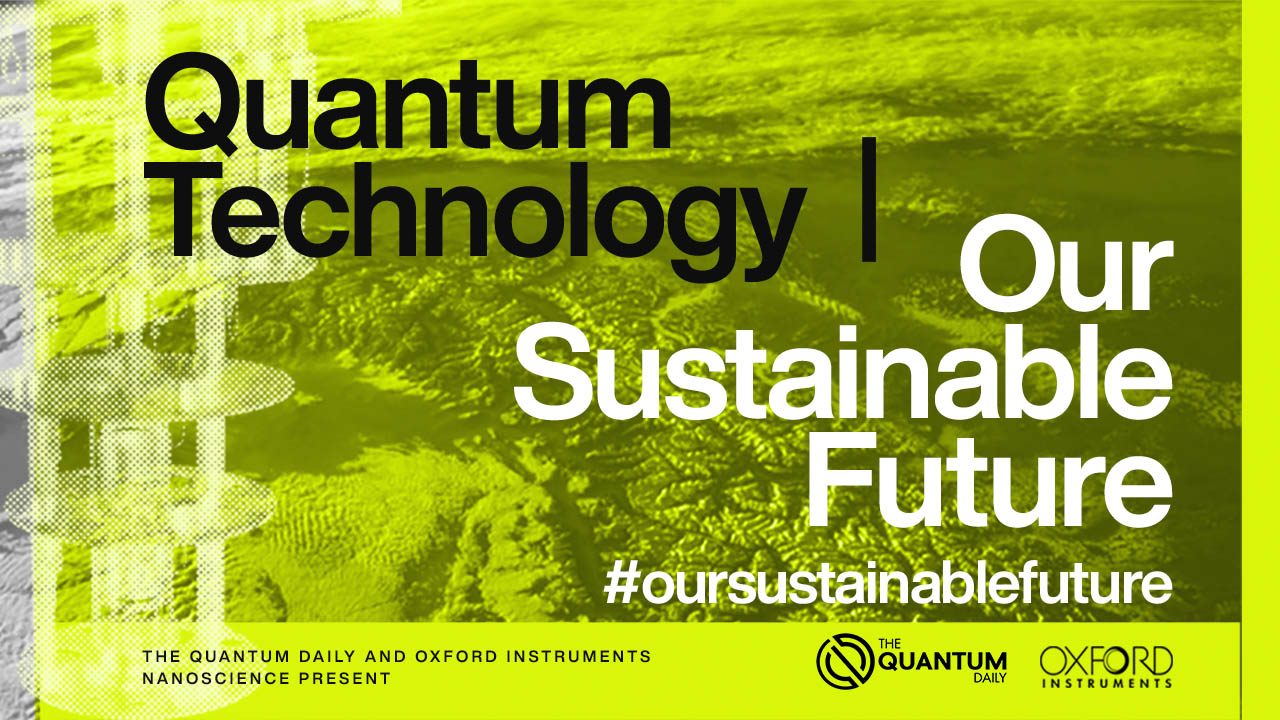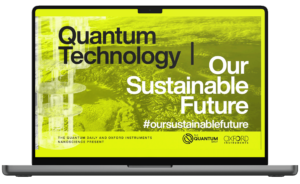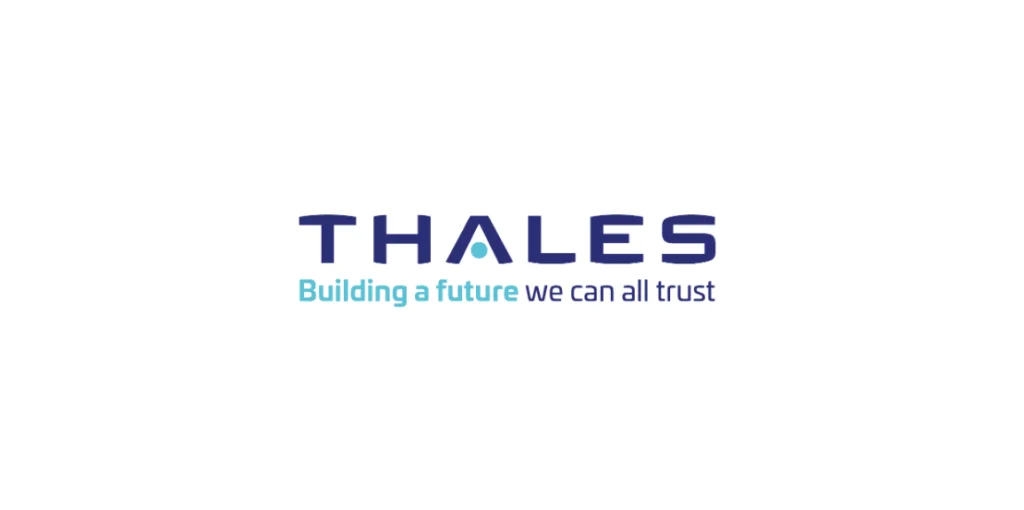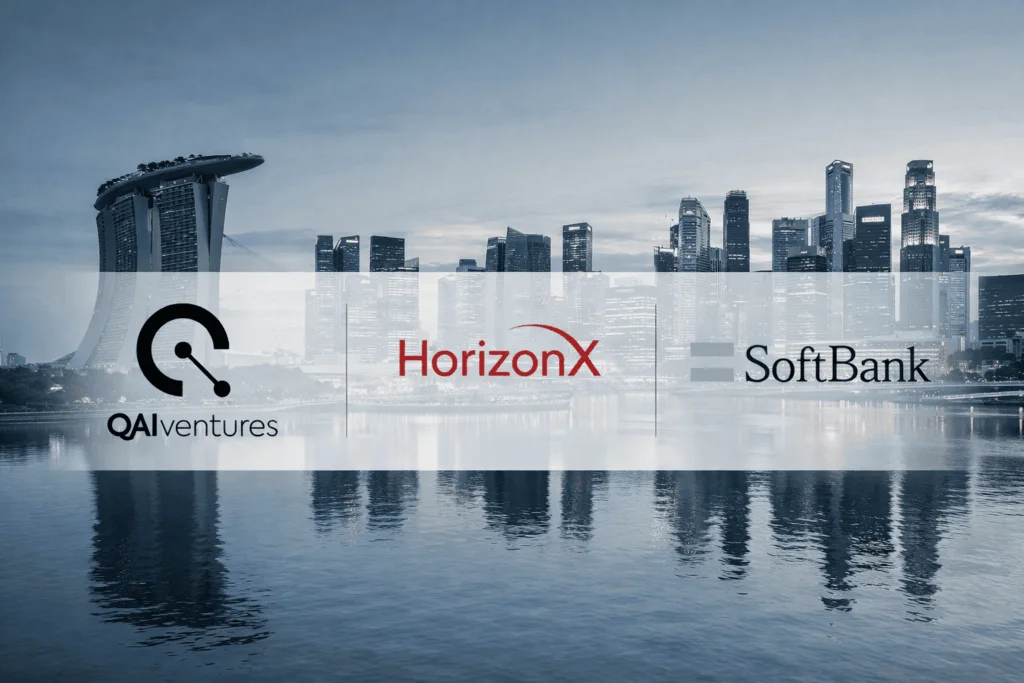Watch the full video here.
Quantum Technology | Our Sustainable Future
Last summer, The Quantum Insider released the documentary Quantum Technology | Our Sustainable Future, developed in partnership with Oxford Instruments NanoScience.
Produced as a call from industry experts to discuss the potential of quantum technology in addressing the world’s urgent sustainability challenges, it included interviews with many of the leading minds in quantum:
• Alan Ho: Head of Product, Google Quantum AI
• Alexandre Blais: Advisory Board, Q4Climate

• Carl Williams: Deputy Director, Physical Measurement Laboratory at NIST
• Flaviu Cipcigan: Research Staff Member, IBM Research
• Hui Zhang: General Manager, Origin Quantum
• Ilana Wisby: CEO, Oxford Quantum Circuits
• Jingen Xiang: CEO, SpinQ
• John Levy: CEO, SEEQC
• Nicolas Sawaya: Research Scientist, Intel Labs
• Pete Shadbolt: CSO, PsiQuantum
• Richard Murray: CEO, ORCA Computing
• Stuart Woods: Managing Director, Oxford Instruments NanoScience
• Tamar Eilam: IBM fellow, IBM’s Thomas J Watson Research Centre
During the thirty-minute documentary, some interesting conclusions were made by the experts who participated:
“I think it’s a sign of the times that, despite the broad range of potential applications for quantum computing, so many groups are specifically focused on climate change,” said Pete Shadbolt, Chief Strategy Officer at PsiQuantum. “It’s inspiring to see the business community prioritize climate applications and acknowledge the gravity of the climate situation we are now in.”
John Levy, CEO of SEEQC, said: “We recognize the centrality of sustainability in the development of quantum systems, both from an energy efficiency perspective as well as with the applications that quantum computers will address in areas such as climate modelling, material science and energy. We are pleased to participate in this important documentary with our colleagues in the quantum space to highlight our collective work on a global scale.”
It is now nearly a year on from this and The Quantum Insider wanted to see what developments have been made in the twelve months since.
Report Findings and Events
Back in May of this year, McKinsey released an article called Quantum computing might just save the planet. In it, the publication stated that quantum computing could assist in the development of climate technologies that would decrease carbon on the order of 7 gigatons a year of additional CO2 impact by 2035 — bringing the world in line with the 1.5°C target.
The article concluded that, though quantum technologies are in the early stage, an unknown proposition and expensive to implement, risks to investors can be reduced through the hiring of technical experts “to run in-depth diligence, forming joint investments with public entities or consortia, and investing in companies that bundle various ventures under one roof and provide the necessary experience to set up and scale these ventures.”
At the Economist Impact “Commercialising Quantum” conference this year, sustainability was a hot topic on the second “virtual” day, with several keynote speeches by industry experts. These included:
- How much of a driver is climate change in the current scope of quantum development? Have we got our priorities right? — by Dr. Juan Bernabé-Moreno, Chief data officer, E.ON
- Delivering a quantum leap on climate change: how ambition and cooperation can keep “1.5 alive” — by Dr. Marko Rančić, Head of quantum computing, TotalEnergies
- Exploring the scope of the opportunity for quantum in the hydrogen economy: methane detection and more — by Robin Yellow, Digital science principal, BP#
Quantum Controversy
The increasing interest in quantum technologies relevant for the climate has created a degree of disagreement in the community. On the one hand, corporates such as PsiQuantum are embracing the concept of using quantum technologies to try and solve some of society’s greatest challenges. The company recently set up Qlimate a “major quantum computing net zero initiative driving large-scale decarbonization”. The organization is building partnerships with corporates, governments and non-profits to develop and scale end-to-end the most promising decarbonization solutions that will take years off the path to net zero. Other organizations have similar aims, for example Q4Climate and Entangle Climate (interview below).
Yet others in the industry have argued that presenting quantum technology as a solution to the climate crisis is little more than the next item in a long list of green-washing initiatives. Quantum computers are yet to produce useful commercial results at scale, let alone clear – in use – solutions to the climate crisis.
Detractors argue that we should be focusing on areas where we can make an impact now. We expect that this is a point of contention unlikely to go away until the community is able to demonstrate a tangible use case that has a positive impact on the environment.
Yet, this overlooks the significant number of quantum technology organizations (for example suppliers) who can consider their impact today, Oxford Instruments being an example.
Oxford Instruments Interview
Returning back to the documentary, we asked Stuart Woods, Managing Director at Oxford Instruments NanoScience, to reflect on the time since the making of our documentary.
TQI: What changes have you seen in the market?
SW: Unfortunately, with the current macroeconomic environment we have seen a greater stress on resources — particularly the availability of renewable energy. It almost feels like we have taken a step backwards. Even in the UK, with rising costs, we have seen a number of energy providers back away from renewable energy strategies. The situation has to change and we need to do more as regulation is not going to be enough to make a tangible enough impact . It looks very unlikely that we are going to be able to limit temperature increases to 1.5C by 2030, unless more businesses and governments prioritize investment in CO2 extraction, for example, putting our NetZero 2050 goal under threat.
TQI: How has your organization pushed its agenda forward?
SW: Within Oxford Instruments, we have made multiple positive advances. For the first time this year, we will have complete visibility of our full Scopes 1, 2, and 3 in line with GHG Protocols. We have also calculated our baseline year to understand, according to industry standard, SBTi, how much carbon we can offset. This gives us our first real data for calculating and making the hard decisions around moving to NetZero before 2050. The journey is just starting as this now brings into focus harder decisions, for example, around abatement activities. Carbon neutrality is not easy, but the first step is clear, industry standards-based monitoring and roadmapping to NetZero is a must. There is a lot of ‘greenwashing’ today which is why we must focus on best practices to achieve real results.

TQI: What are the next steps you want to see in the industry?
SW: I do believe that technology is a big part of the answer to slow climate change. Quantum computing should not be viewed as the new arms race. Climate change and the complex models of climate are a natural fit for quantum computing and for this reason alone we should look at global initiatives for climate change analysis using quantum computing. We are keen to support the industry in any initiatives and are keen to actively engage in programs to make a difference.
Having picked the brain of one expert on the theme of sustainability within the industry, we wanted to ask another individual’s view.
Entangle Climate – a discussion with Nicholas Lee
Co-founder of Entangle Climate (along with Karan Pinto)— a non-profit whose aim is to accelerate innovation at the intersection of Quantum Computing and Climate Mitigation by aligning professionals across the ecosystem — Nicholas Lee is also Vice-head of Solution Innovation & Consulting AI/ML, Quantum-inspired and Decision Science at Fujitsu.

Lee says the avoidance of a climate disaster is the greatest challenge of the century. To make this happen, we need to transform the way we do almost everything. This beckons for breakthroughs and innovations that become new businesses and change existing ones. Today, it is almost free to pollute the atmosphere with CO2.
Harsh Truth
“The harsh meta truth: whether we like it or not, we need fossil fuel-based businesses for the solutions that accelerate our transition to decouple from CO2,” says Lee.
Lee then shifted to capital markets and the fact they are aligned with sustainable development, seen as a keystone for helping to bridge the gap to combat Climate Change.
“The past decade has seen a surge in financial investments which are dedicated to sustainability. UNCTAD estimated in late 2020 that these new financial products and funding sources have invested $1.2-$1.3 trillion through areas such as clean energy, clean technology, sustainable agriculture, food securities, sustainability-themed funds, green bonds, and social bonds, but with a sizeable gap remaining, and an annual reoccurring requirement, we must think outside the box for how we achieve this,” says Lee.
“At the intersection of accelerating Climate Mitigation efforts is a significant role for quantum technologies as they have the means to reshape how we tackle and solve these social challenges. Quantum Computers are already showing significant advancements in many pressing areas such as accelerating drug discovery, enabling more efficient supply chains and providing more personalized healthcare services.”
How do these problem characteristics transfer into the problems we need to address to tackle Climate Change?”
Use Cases
Lee believes the answer will come through initiatives like the open-ecosystem Entangle Climate, which he co-founded, one which is exploring over eighty use cases across six key pillars: Energy, Transport, Cities and Buildings, Agriculture, Industry, and Nature-based.
“Part of addressing this challenge is building an open awareness, unleashing knowledge from silos, and not trying to corner a particular market for the greater good of humanity. The other part, relative to quantum, is to embrace hybrid approaches that leverage a wide array of capabilities across simulation, emulation, gate-based systems, along with HPC, AI/ Machine Learning and Classical Solvers,” says Lee, before adding a caveat:
“There is no silver bullet, no one compute will solve the entirety of the problems and we won’t wake up one day and have all the answers. We must recognize the step changes we are making today with quantum computing and take a practical approach on how we find more efficient solutions for tomorrow.”
Investing in quantum to address the climate crisis
Another example of quantum addressing the problems of climate change is investment by impact / climate funds in the market. The Finnish startup IQM raised $128-million Series A2 funding round, led by World Fund, the largest European-focused climate venture capital fund that only invests in technologies with a Climate Performance Potential (CPP) of removing 100 million tonnes of carbon from the atmosphere annually by 2040 —something which IQM’s quantum algorithms are apparently already busy tackling.
Daria Saharova, Founding Partner at World Fund, said of the investment: “Quantum computing holds the potential to drive the breakthroughs needed to help solve the climate crisis. We are proud to lead this round and support IQM’s ambition to deliver quantum advantage to climate and sustainability goals.
TQI is looking at ways — like other individuals and their respective companies mentioned here — to further accelerate the work happening in this space. If you are interested in pushing the dialogue forward, please contact us at hello@thequantuminsider.com.
For more market insights, check out our latest quantum computing news here.

















